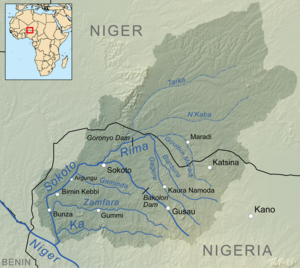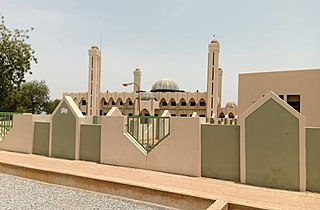
The Zauro polder project is an irrigation scheme that has long been planned for the Rima River floodplain in Kebbi State, Nigeria. The project is controversial, and would demand careful management to achieve the planned benefits.

The Zauro polder project is an irrigation scheme that has long been planned for the Rima River floodplain in Kebbi State, Nigeria. The project is controversial, and would demand careful management to achieve the planned benefits.
Kebbi State is mainly covered by Sudanian Savanna, open woodland with scattered trees. It is intersected by the lowlands of the Rima and Niger rivers, which are seasonally flooded. There is a wet season between May and September, with little rain in the remainder of the year. Mean annual rainfall is about 800 millimetres (31 in). Average temperatures are about 26 °C (79 °F), ranging from 21 to 40 °C (70 to 104 °F) between April and June. Dams and irrigation schemes have often been proposed to make the abundant water of the rainy season available for farming in the dry season. [1]
The project was originally conceived in 1969 as a joint venture between the state government and the federal ministry of agriculture and water resources. The dam would be situated in the floodplain of the Rima River between Argungu and Birnin Kebbi, irrigating 10,572 hectares (26,120 acres) of farmland. Crops would include rice, maize, wheat, barley and vegetables such as cow peas, onions, tomatoes, sweet potatoes and Irish potatoes. The dam would also benefit the fishing industry, important in the state. The project would include construction of a reservoir and canals used to irrigate and drain polders, areas of farmland protected from flooding by dikes. After a review of the original design, it was changed to reduce water loss from evaporation in the dry season, and also reduce costs, by replacing the open channels with an aquifer recharge system, using wells to draw water from the aquifer for irrigation. The risk of damage from flooding would be mitigated by the Goronyo Dam upstream in Sokoto State, which would also provide water in the dry season. [2]
There have been repeated delays. A July 1995 report noted that the project was in "standstill" status. [3] In March 2003, while campaigning for reelection in Birnin Kebbi, President Olusegun Obasanjo pledged to complete the project. [4] In October 2006, the Federal and Kebbi state governments signed a memorandum of understanding for execution of the project, at an estimated cost of N15 billion. [5] In May 2008 President Umaru Musa Yar'Adua ordered work to start immediately on the first phase of the project, which was now estimated to cost over N18.5 billion. [6] In January 2009, Kebbi State governor Sa'idu Dakingari said work would soon commence. [7]
A pilot project was inaugurated in 1982 covering 100 hectares in the northern part of Birnin Kebbi. A study of the project issued in 2009 stated that conditions have steadily deteriorated during the project lifetime, with water-logging causing loss of productive farmland due to salinity and alkalinity. The causes include lack of site leveling to allow outflow of surface water, poor maintenance of drains and canals and over-irrigation by farmers. These issues would have to be addressed for the full project to succeed. [8] In 2000, the Federal Ministry of Water Resources said that it was planning to rehabilitate the pilot project. [9] An audit of Federal Government accounts for the year 2007 showed that a 2002 contract worth almost N84 million with 25% advance payment had been awarded for rehabilitation of the dikes and drainage. However, the project seemed to have been abandoned after payment of the mobilization fee. [10]
In July 2008, over 1,000 farmers protesting the siting of the project tried to lynch the Kebbi State Deputy Governor, Alhaji Ibrahim Aliyu and the Emir of Argungu, Alhaji Samaila Mera at the Emir's palace. [11] One concern is that the reservoir will flood the area where the Argunga fishing festival is held, an important source of income from tourists. There were threats to disrupt to 2009 Argunga fishing festival, but the Emir promised to provide a solution after the festival was held. When none was forthcoming, the people of Argunga started throwing stones at the Emir whenever they saw him. Some farmers are concerned that the project will flood their farmland, although they have been assured that they will be paid compensation and helped to relocate. Others blame resistance on fear of the unknown, and are confident that the project will improve agricultural productivity, saying they are confident that the government is doing the right thing. [2]
Conflicts over irrigation and flood control projects such as the Zauro polder project are unavoidable. Farmers with low-lying fields want less flooding while farmers higher up want more. Fishermen want early flooding, farmers want later flooding and pastoralists want an early dry season so they can access grazing lands. With proper management, these problems can be solved. [3]

The Argungu Fishing Festival or Argungu Dance Festival is an annual four-day festival in Kebbi State and other northern states like Niger in the north-western part of Northern Nigeria. The region is made up of fertile river areas of (matanfada, mala with much irrigation and orchards. The majority of inhabitants are fishermen who are practitioners of Isla religion. They also have Kanta Museum. The Museum is the main historical centre in Argungu for visitors across the globe. People from around the world travel to Argungu just to witness the occasion. The main purpose of the Argungu fishing festival is for fishing and unity. The festival is usually a 4-days cultural event.

Kebbi State is a state in northwestern Nigeria. Kebbi State is bordered east and north of Sokoto and Zamfara states, and to the south by Niger state while its western border forms part of the national borders with Benin Republic for 103 km and Niger for 207 km. Named for the city of Birnin Kebbi—the state's capital and largest city, Kebbi state was formed from Sokoto state on 27 August 1991. Of the 36 states of Nigeria, Kebbi is the tenth largest in area and 18th most populous, with an estimated population of about 4.4 million as of 2016. The state is known as land of equity.

The Sokoto River,, is a river in north-west Nigeria and a tributary of the River Niger. The river's source is near Funtua in the south of Katsina State, some 275 kilometres (171 mi) in a straight line from Sokoto. It flows north-west passing Gusau in Zamfara State, where the Gusau Dam forms a reservoir that supplies the city with water. Further downstream the river enters Sokoto State where it passes by Sokoto and is joined by the Rima River, then turning south and flowing through Birnin Kebbi in Kebbi State. About 120 kilometres (75 mi) south of Birnin Kebbi, it reaches its confluence with the Niger River.
Argungu is a city in Nigeria's Kebbi State, situated on the Sokoto River. As of 2007 Argungu had an estimated population of 47,064. The city is the seat of the Argungu Emirate, a traditional state. The city is a major agricultural center for the area, with key crops including tobacco, peanuts, rice, millet, wheat, and sorghum. The city also hosts an annual international fishing festival which was suspended for 11 years. The Argungu fishing festival was held again in the year 2020 from March 11–14

Birnin Kebbi is a city located in Northwestern Nigeria It is the capital city of Kebbi State and headquarter of the Gwandu Emirate. As at 2007 the city had an estimated population of 125,594 people. Kebbi is mostly a Hausa and Fulani state, with Islam as the major religion. Formerly it was the capital of the Kebbi Emirate, which relocated to Argungu after the conquest by Gwandu in 1831. The town remained the capital of Kebbi until 1805, when it was burned in the Fulani jihad by Abdullahi dan Fodio, a brother of the jihad leader and later Emir of Gwandu. After Birnin Kebbi was incorporated into the Fulani Emirate of Gwandu, it was eclipsed in political importance by Gwandu (Gando) town, 30 miles (48 km) east, and as a caravan and riverside market centre by Jega, 20 miles (32 km) southeast, which lay at the head of navigation on the Zamfara River, a tributary of the Sokoto. Ironically, while Argungu became the traditional seat of the king of Kebbi in 1827, Birnin Kebbi served as the Gwandu emirate headquarters after Emir Haliru was inaugurated there in 1906. Birnin Kebbi became the capital of the newly created Nigerian state of Kebbi in 1991.

The Rima River is a river in the northern part of Nigeria. At its northernmost point it is joined by the Goulbi de Maradi river. It runs southwest and joins the Sokoto River near Sokoto, then continues south to the Niger River. The upper Rima is a seasonal river and flows only during the rainy season. The Zauro polder project, a major irrigation scheme, has been planned for many years. It would irrigate 10,572 hectares of farmland in the Rima floodplain between Argungu and Birnin Kebbi.
Mohammed Magoro is a retired Major General of the Nigerian army who was twice a government minister, under Generals Obasanjo and Buhari. In the April 2011 elections he was elected Senator for the Kebbi South constituency of Kebbi State, Nigeria.

Turai Umar Musa Yar'Adua is the widow of the former Nigerian president and former Katsina State Governor, Umaru Musa Yar'Adua. She was the First Lady of Nigeria from 2007 until the death of her husband on 5 May 2010.

The Goulbi de Maradi is a river in south central Niger and north central Nigeria. Between its source near Katsina in Nigeria, and its end in the Rima River, the Goulbi de Maradi never flows more than 48 kilometres (30 mi) from the Niger–Nigeria border. Though important for agriculture and pastoralism, and flowing through the Niger cities of Maradi, Guidan Roumdji, and Madarounfa, the Goulbi de Maradi is a seasonal river and flows only during the rainy season.

The Kafin Zaki Dam is a controversial project to build a reservoir on the Jama'are River in Bauchi State in the Northeast of Nigeria.

The Bakolori Dam is in Sokoto State in northwest Nigeria. It was completed in 1978 and its reservoir filled by 1981. It is a major reservoir on the Sokoto River, a tributary of the Rima River, which in turn feeds the Niger River. Water from the dam supplies the Bakolori Irrigation Project.

Audu Bako (1924–1980) was a Nigerian police officer and the first Governor of Kano State during the military regime of General Yakubu Gowon after the state was formed from part of Northern Region.
The Zobe Dam is in Dutsin-Ma local government area of Katsina State in the north of Nigeria. It is an earth-fill structure with a height of 19 m and a total length of 2,750 m. The dam has a storage capacity of 179 Mca and irrigation potential of 8,000 hectares. Although the dam was completed in 1983, as of 2010, it was still not being used for water supply to Katsina city, for local irrigation or for power generation.

The Goronyo Dam impounds the Rima River in Goronyo local government area of Sokoto State in the northern Nigeria. It was completed in 1984 and commissioned in 1992. The dam is a sand-fill structure with a height of 21 m and a total length of 12.5 km. It has a storage capacity of 976 million cubic meters. The dam will be important in controlling floods and releasing water in the dry season for the planned Zauro polder project downstream in Kebbi State.
The Kebbi Emirate, also known as the Argungu Emirate is a traditional state based on the town of Argungu in Kebbi State, Nigeria. It is the successor to the ancient Hausa kingdom of Kebbi. The Emirate is one of four in Kebbi State, the others being the Gwandu Emirate, Yauri Emirate and Zuru Emirate.
The 2011 Kebbi State gubernatorial election occurred on April 26, 2011. PDP candidate Usman Saidu Nasamu Dakingari won the election, defeating CPC Abubakar Abubakar and 13 other candidates.
The 2012 Kebbi State gubernatorial by-election occurred on March 31, 2012. PDP candidate Usman Saidu Nasamu Dakingari won the election, defeating CPC Abubakar Abubakar and 13 other candidates.
The 2023 Kebbi State gubernatorial election will take place on 18 March 2023, to elect the Governor of Kebbi State, concurrent with elections to the Kebbi State House of Assembly as well as twenty-seven other gubernatorial elections and elections to all other state houses of assembly. The election—which was postponed from its original 11 March date—will be held three weeks after the presidential election and National Assembly elections. Incumbent APC Governor Abubakar Atiku Bagudu is term-limited and cannot seek re-election to a third term.
The Adamu Augie College of Education is a state government higher education institution located in Argungu, Kebbi State, Nigeria. The current acting Provost is Abubakar Abubakar Birnin Kebbi.
Zainab Usman Saidu Dakingari is the daughter of the former president of Nigeria, Alhaji Umaru Musa Yar'Adua and wife to the former Executive Governor of Kebbi State, Alhaji Usman Saidu Nasamu Dakingari.